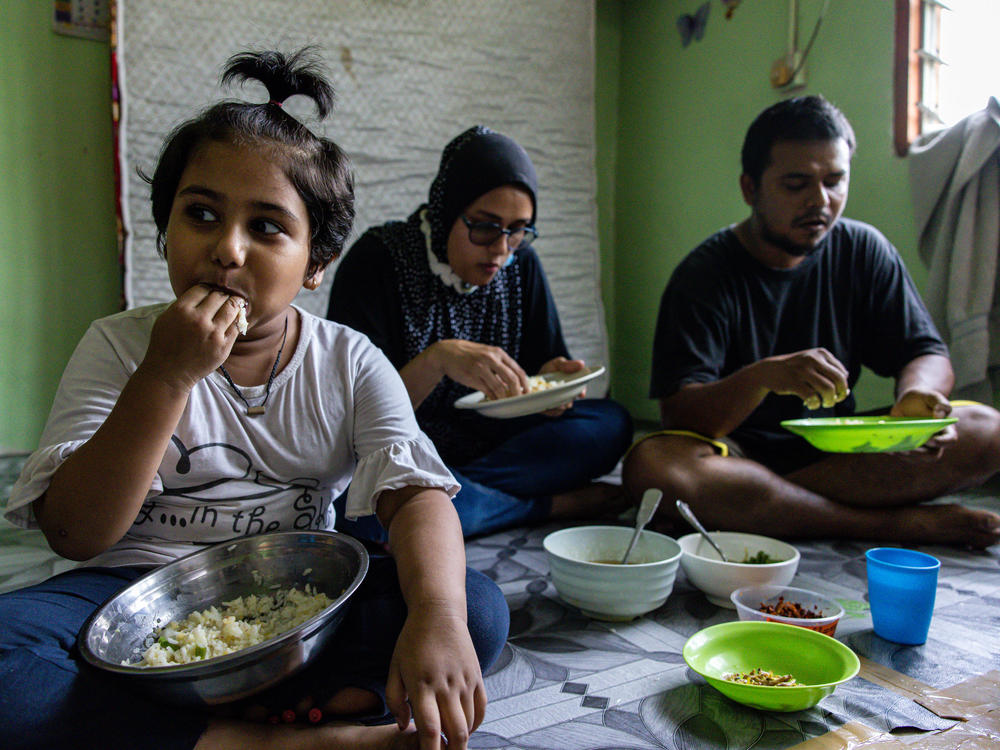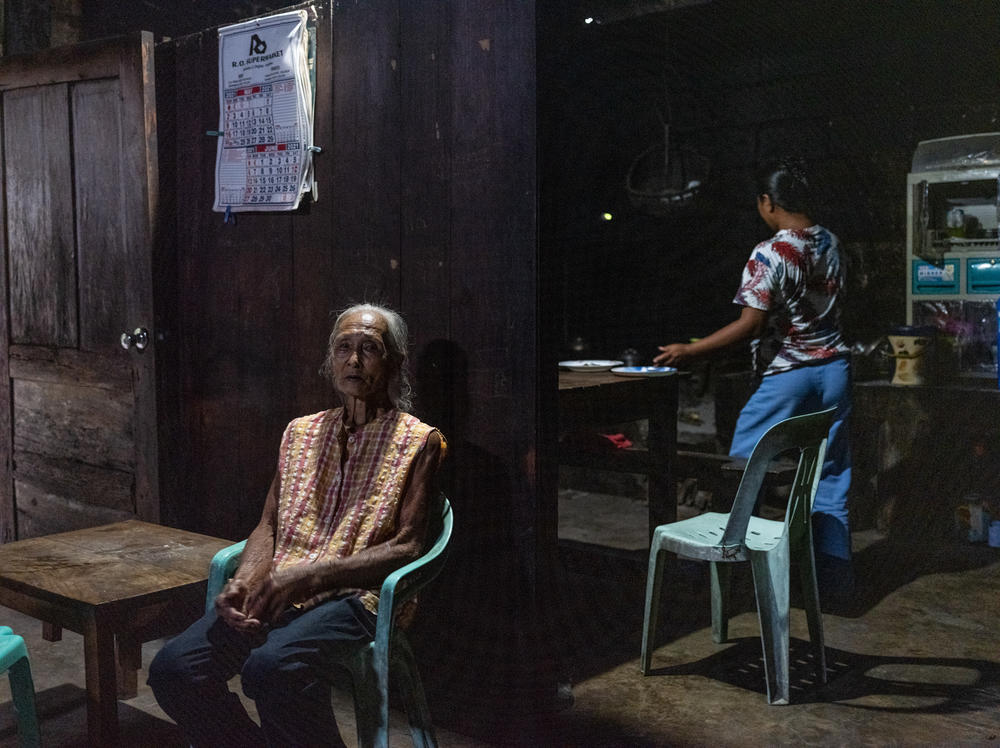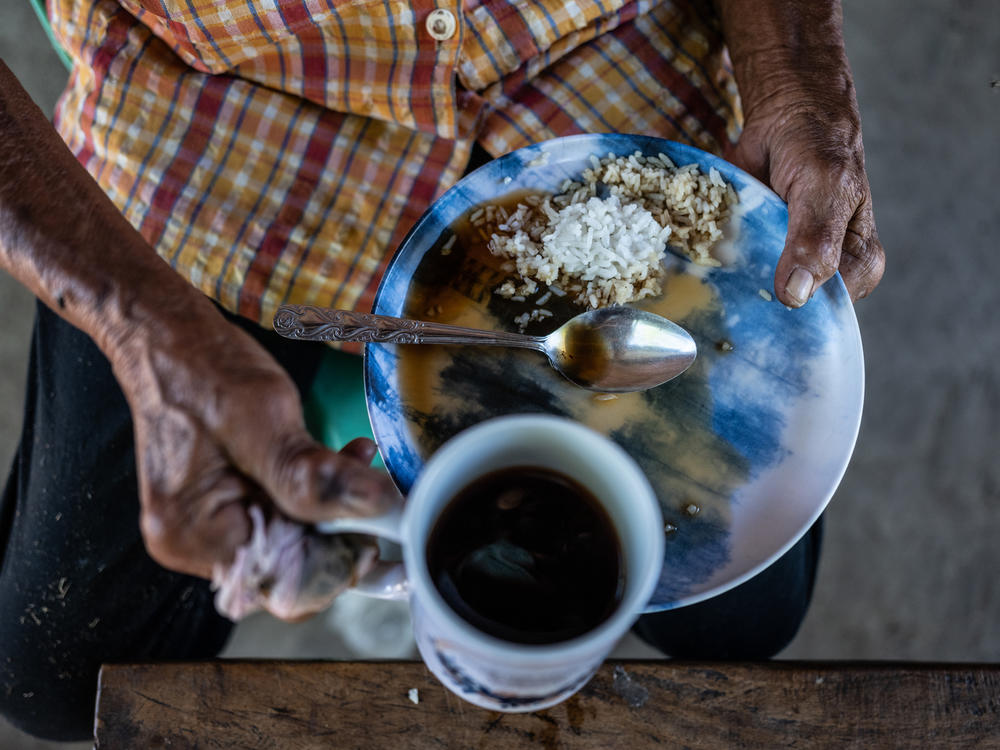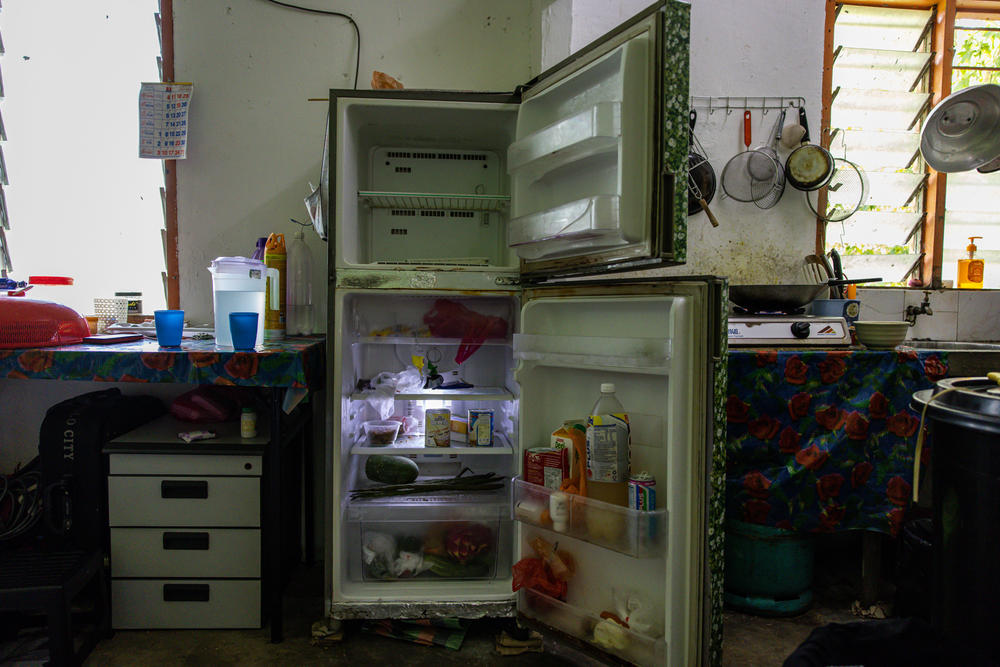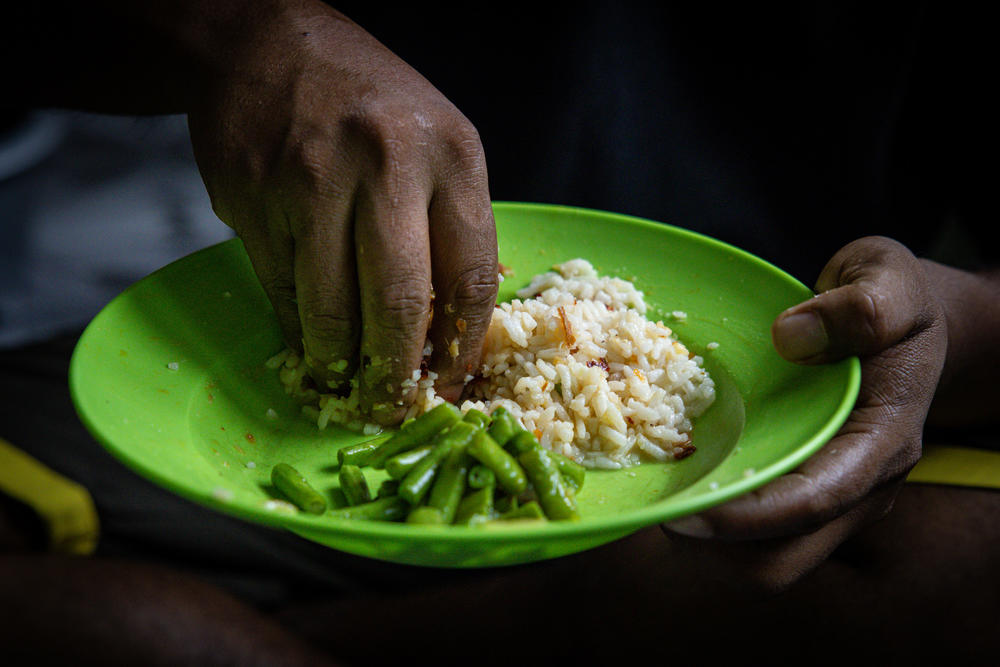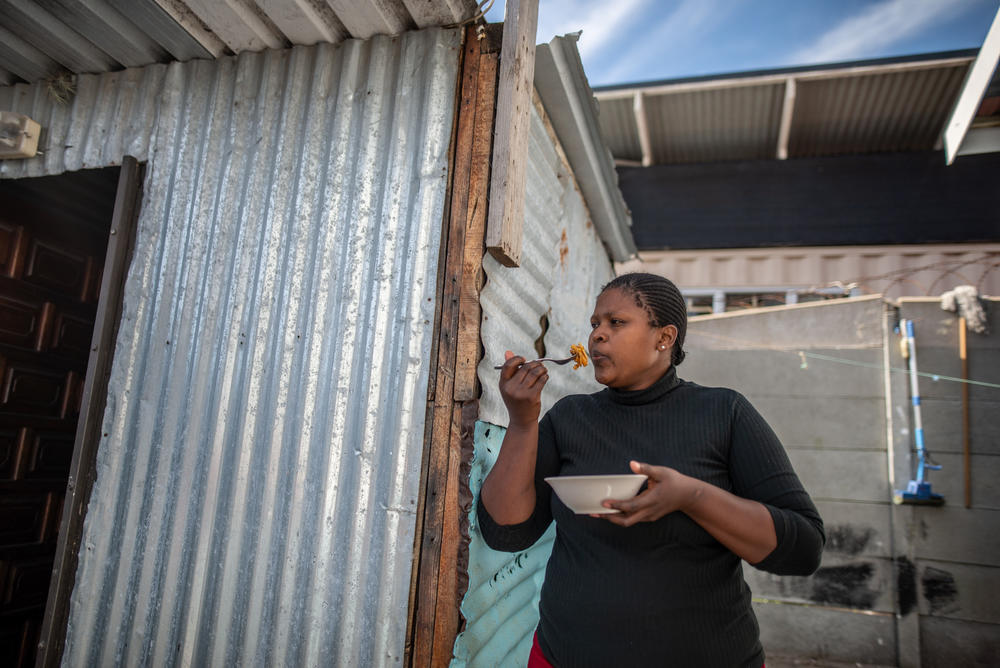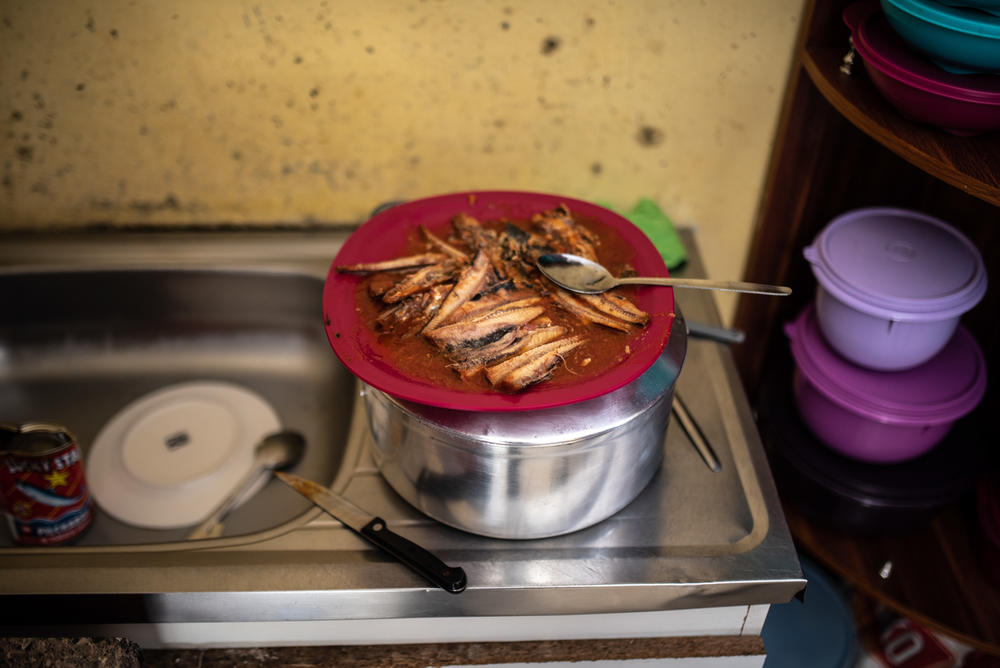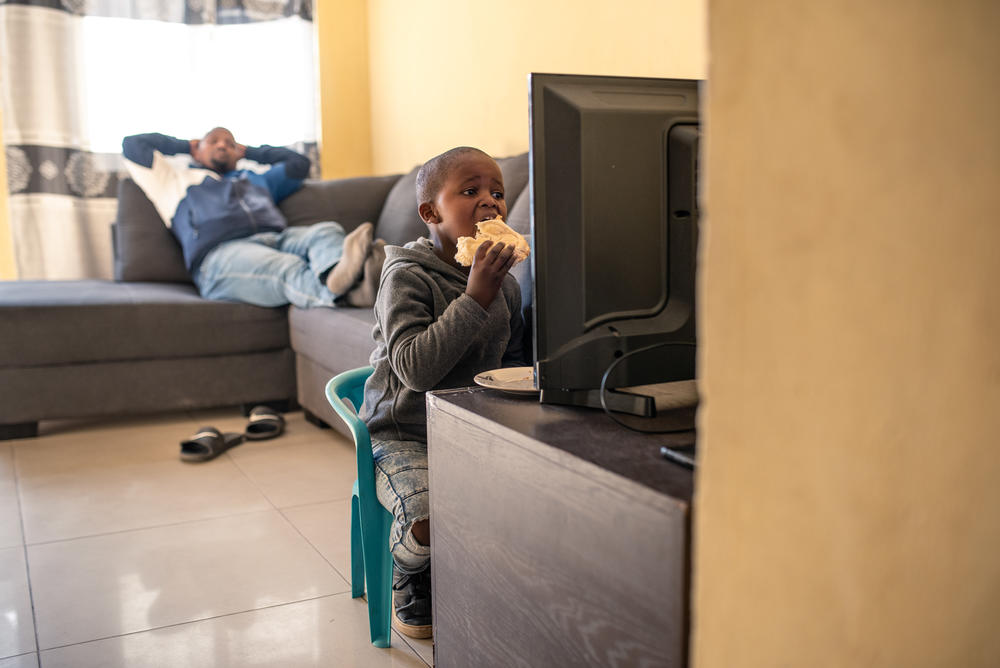Section Branding
Header Content
PHOTOS: How Struggling Families Manage To Feed Their Kids In A Pandemic
Primary Content
When I was a kid, my Filipino mom used to serve my little sister and me freshly made rice – soft, fluffy and steaming — at dinner, while she would eat the hard, dry leftover rice from the previous day.
It was a small act of love and sacrifice. She didn't want to risk running out of fresh rice for us kids.
That's how parents think. And in a pandemic that pushed one in every three people into food insecurity in 2020, according to the U.N., the sacrifices are even greater. Last week, we published a special report on people who are now struggling to put food on the table. Parents and grandparents told us they are skipping meals or eating cheap, filling but not very nutritious foods so they can use their limited budget to provide for the youngsters in the family.
But they're still finding ways to keep their children fed.
Read their stories below — and read more stories about food insecurity in the pandemic here. -- Malaka Gharib
NUEVA VIZCAYA, PHILIPPINES
No matter how little you have, 'always feed the little ones'
Gloria Hernandez, 82, says her greatest concern in the pandemic is making sure her two young grandsons are fed.
"Always feed the children," she says. "No matter how difficult life is, always feed the little ones. We adults can survive." When Gloria and her daughter get vegetables, fish or meat, they give it to the boys.
Before COVID, Hernandez earned a living by selling bags of rice harvested by her children, who are farmers. But because their work in the fields has been disrupted by lockdowns, they have been giving her fewer bags.
So Hernandez has taken on a variety of jobs to support herself and her household. Her 52-year-old daughter and her two grandsons, a 15-year-old student and a 22-year-old who works as an unpaid intern at the local municipal office, live with Hernandez and depend on her.
She supplements her income by making and selling walis ting ting, brooms made with coconut fibers. When there's farm work, she takes it, but there hasn't been much during the pandemic.
She gets $10 a month from her government pension, which she uses to buy hypertension medication and milk, but it's still not enough to feed everyone. So sometimes she borrows from loan sharks.
For breakfast and lunch, Hernandez and her daughter eat rice with a little coffee poured on top for flavoring. Dinner is usually dried fish with rice for dinner. They know it's not a healthy diet, but it's better than going hungry, she says. Hernandez yearns for the chicken and fresh fish she used to eat.
Photos and reporting by Xyza Cruz Bacani
SELANGOR, MALAYSIA
Beans, biscuits and noodles to stave off hunger — with an occasional serving of chicken for their 6-year-old
When the pandemic hit, the national army put a barbed wire fence around Mohd Ali's neighborhood. The idea was to restrict movement and prevent COVID-19 transmission. For Ali, the fence made it impossible to get to his job as a restaurant dishwasher.
Then after a cycle of lockdowns, the restaurant closed earlier this year.
The job was a good one. Ali, 32, earned $10-12 a day and could support his family. He's been trying to find a new gig, but it's been difficult, he says. The job market is saturated. And he lives in the country without legal permission, making it even harder for him to find work. He and his family came to Malaysia in 2015 to escape the Rohingya crisis in Myanmar.
What's most important to him, he says, is taking care of his pregnant wife and 6-year-old daughter. The family has been living off dwindling savings, food aid from charities organizations and kindly neighbors who occasionally offer provisions.
The family's favorite foods — fried chicken, eggs, fruit and bread — are now out of their budget. They eat mainly beans. They can afford a small amount of chicken but give most of it to their daughter. To avoid hunger pangs, Ali says he fills his stomach with biscuits and instant noodles, but worries that it's not a healthy diet.
Sometimes, he says, he thinks about moving to Milwaukee. It's where his wife's sister lives.
Photos and reporting by Annice Lyn
CAPE TOWN, SOUTH AFRICA
'Their education is more important than our stomachs'
Aviwe Maphini, 30, was moving up in her career as a lawyer. She even got a raise. She and her husband, a policeman, made enough to send their 6-year-old son and 8-year-old daughter to "a good school," she says. And the couple could even give money to their siblings.
They also had enough disposable income to treat themselves. "I was able to take my family out on occasions — to the beach, to restaurants," she says. "We used to go to Bonnaire's [a pizza franchise]. The kids always looked forward to payday because they knew we would take them out just to spoil them."
Maphini lost her job at the beginning of the pandemic. "[My supervisor] called me into a meeting and told me I was going to be in the first phase of retrenchments," she says. "I was so sad and distressed. The first thing I thought of was my kids."
Thankfully, she says, her husband was able to keep his job — and his salary keeps them afloat. "He's the one who's repaying the house loan, buying the kids' clothes and paying for their school fees."
Instead of heading into a law firm each day, Maphini volunteers at a soup kitchen three days a week. She can bring some of the leftover food home.
The family's meals have changed dramatically. "Before the pandemic I used to buy red meat, sausages, salads. We're eating a lot of rice now, and soup and potatoes," says Maphini. Sometimes she and her husband skip meals.
Her biggest goal, she says, is making sure her kids stay in school. "Their education is more important than our stomachs. As long as we can still afford something to eat at the end of the day, it's OK."
Photos and reporting by Tommy Trenchard
Additional credits
Xyza Cruz Bacani and Annice Lyn are part of the Everyday Projects community, contributing to Instagram accounts from countries in Asia, Africa, Central and South America, North America and Europe. Visuals edited by Ben de la Cruz, Ian Morton and Nicole Werbeck. Text by Suzette Lohmeyer. Text edited by Malaka Gharib and Marc Silver. Special thanks to Caroline Drees, senior director for field safety and security at NPR.
Let us know what you think of this story. Email goatsandsoda@npr.org with your feedback with the subject line "Food Insecurity."
Copyright 2021 NPR. To see more, visit https://www.npr.org.
